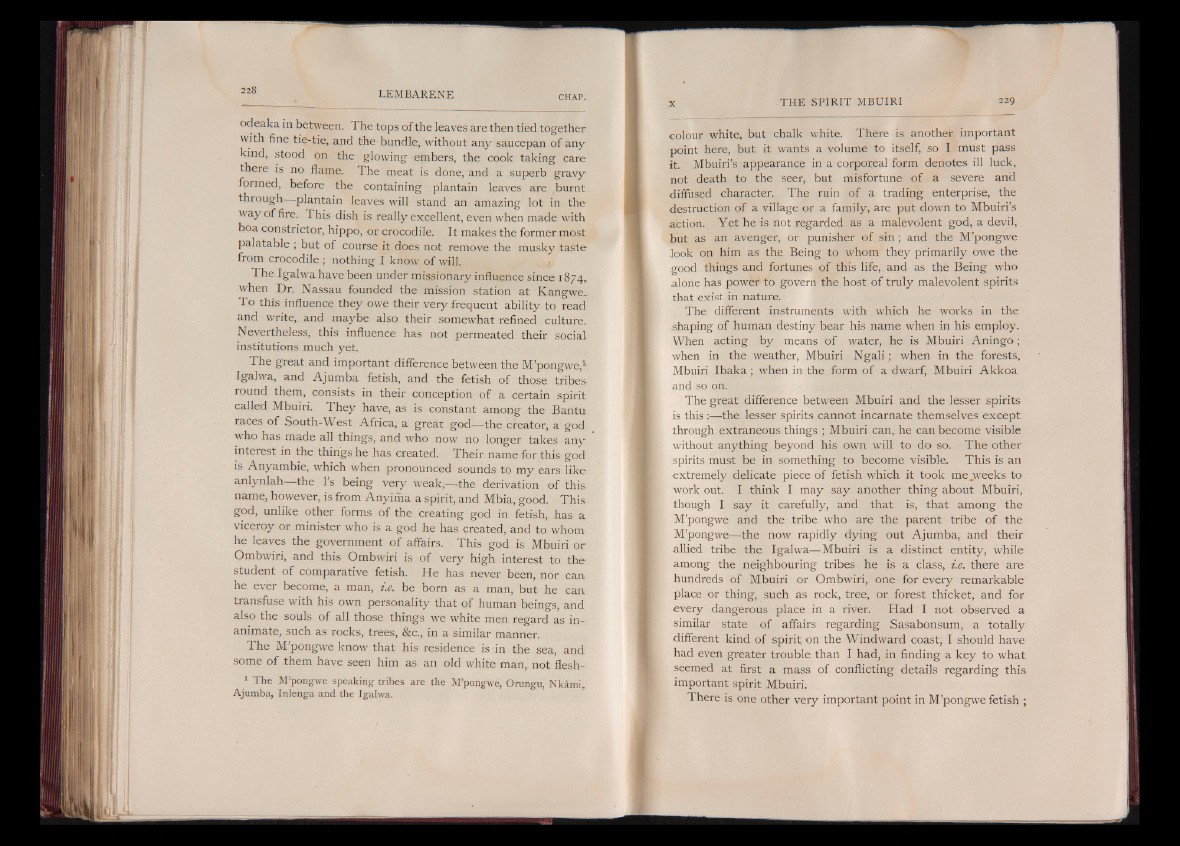
odeaka in between. The tops of the leaves are then tied together
with fine tie-tie, and the bundle, without any saucepan of any
kind, stood on the glowing embers, the cook taking care
there is no flame. The meat is done, and a superb gravy
fprrned, before the containing plantain leaves are burnt
through plantain leaves will stand an amazing lot in the
way of fire. This dish is really excellent, even when made with
boa constrictor, hippo, or crocodile. It makes the former most
palatable ; but of course it does not remove the musky taste
from crocodile; nothing I know of will.
The Igalwa have been under missionary influence since 1874,
when Dr. Nassau founded the mission station at Kangwe.
To this influence they owe their very frequent ability to read
and write, and maybe also their somewhat refined culture.
Nevertheless, this influence has not permeated their social
institutions much yet.
The great and important difference between the M’pongwe,1
Igalwa, and Ajumba fetish, and the fetish of those tribes
round them, consists in their conception of a certain spirit
called Mbuiri. They have, as is constant among the Bantu
races of South-West Africa, a great god— the creator, a god
who has made all things, and who now no longer takes any
interest in the things he has created. Their name for this god
is Anyambie, which when pronounced sounds to my ears like
anlynlah the 1 s being very weak,— the derivation of this
name, however, is from Anyima a spirit, and Mbia, good. This
god, unlike other forms of the creating god in fetish, has a
viceroy or minister who is a god he has created, and to whom
he leaves the government of affairs. This god is Mbuiri or
Ombwiri, and this Ombwiri is of very high interest to the
student of comparative fetish. He has never been, nor can
he ever become, a man, i.e. be born as a man, but he can
transfuse with his own personality that of human beings, and
also the souls of all those things we white men regard as inanimate,
such as rocks, trees, &c., in a similar manner.
The M’pongwe know that his residence is in the sea, and
some of them have seen him as an old white man, not fleshi
The M’pongwe speaking tribes are the M’pongwe, Orungu, Nk&mi,
Ajumba, Inlenga and the Igalwa.
colour white, but chalk white. There is another important
point here, but it wants a volume to itself, so I must pass
it. Mbuiri’s appearance in a corporeal form denotes ill luck,
not death to the seer, but misfortune of a severe and
diffused character. The ruin of a trading enterprise, the
destruction of a village or a family, are put down to Mbuiri’s
action. Yet he is not regarded as a malevolent god, a devil,
but as an avenger, or punisher of sin; and the M’pongwe
look on him as the Being to whom they primarily owe the
good things and fortunes ;of this life,, and as the Being who
alone has power to govern the host of truly malevolent spirits
that exist in nature.
The different instruments with which he works in the
shaping of human destiny bear his name when in his employ.
When acting by means of water, he is Mbuiri Aningo;
when in the weather, Mbuiri N g a li; when in the forests,
Mbuiri Ibaka; when in the form of a dwarf, Mbuiri Akkoa
and so on.
The great difference between Mbuiri and the lesser spirits
is this :—-the lesser spirits cannot incarnate themselves except
through extraneous things ; Mbuiri can, he can become visible
without anything beyond his own will to do so. The other
spirits must be in something to become visible. This is an
extremely delicate piece of fetish which it took me„weeks to
work out. I think I may say another thing about Mbuiri,
though I say it carefully, and that is, that among the
M’pongwe and the tribe who are the parent tribe of the
M’pongwe— the now rapidly dying out Ajumba, and their
allied tribe the Igalwa— Mbuiri is a distinct entity, while
among the .neighbouring tribes he is a class, i.e. there are
hundreds of Mbuiri or Ombwiri, one for every remarkable
place or thing, such as rock, tree, or forest thicket, and for
every dangerous place in a river. Had I not observed a
similar state of affairs regarding Sasabonsum, a totally
different kind of spirit on the Windward coast, I should have
had even greater trouble than I had, in finding a key to what
seemed at first a mass of conflicting details regarding this
important spirit Mbuiri.
There is one other very important point in M’pongwe fetish ;